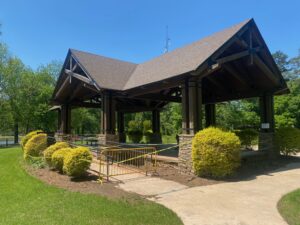UPDATED FOR PRINT July 27,2011 — Peachtree City Mayor Don Haddix is not about to apologize for what his fellow council members are calling a pattern of “negative comments” that affect the city’s working relationship with other persons and agencies.
Haddix left Thursday’s council meeting prematurely in an effort to insure that he has a chance to respond to an effort to reprimand him that is being undertaken by three other city council members.
In doing so, Haddix prevented council from taking a vote on the matter because under city rules there weren’t enough council members present for an official vote to occur, in part due to the absence of Councilman Doug Sturbaum. The item is expected to be on the next City Council agenda for Thursday, Aug. 4.
Haddix’s walkout didn’t stop Council members Eric Imker, Kim Learnard and Vanessa Fleisch from explaining in detail to the public why they felt Haddix should be censured.
Learnard said the mayor’s negative comments at meetings, in letters to the editor and in online blogs pushed her to the breaking point after what she called “an 18-month pattern of negativity.”
Fleisch and Imker both said they have had to apologize to elected and appointed officials, whom the city is trying to “build relationships with,” due to comments made by Haddix. They cited comments Haddix made about the county development authority and also the Georgia Department of Transportation.
Learnard said the reason council was addressing the issue is an effort to stop the negativity.
“We need to stop being our worst enemy,” Learnard said.
In an interview Monday, Haddix said he felt he could “prove all their accusations false.”
Haddix argued Thursday night that since the item was put on the agenda just over a day before, he hadn’t had time to prepare a response. But he was unable to convince his fellow council members to postpone the matter.
“I gave them the polite way out in compromise, but they refused to take it,” Haddix said. “I was trying to be civil. But they refused it and as far as I’m concerned, they talked down to me.”
Haddix said he was disturbed by the notion that he wouldn’t get a chance to respond to the accusations contained in the censure resolution.
“That is very troubling and very reflective of the majority on council in that when you start denying somebody their first amendment rights and the right of self-defense, that says a lot and it speaks to their character,” Haddix said.
The censure resolution specifically claims that Haddix “has created an untenable work environment by publicly belittling and criticizing current and former city employees, elected officials and appointed officials, resulting in at least one lawsuit with related costs to the city.”
Additionally the document claims that Haddix’s comments and actions “put the City of Peachtree City at financial risk, create an untenable work environment, and damage the City’s relationships with other governmental agencies.”
The resolution asks Haddix to “correctly carry out the duties of Mayor, adhere to the City Charter, Council Rules, and common courtesy, work effectively as a member of the City Council, and work effectively in his capacity of Mayor with other state and local government agencies.”
Haddix said he has had some support from city residents, and he challenges the position that a majority of city residents support the censure.
“I know it’s their perception and they see it that way, but it’s not what I’m getting,” Haddix said.
As to trying to find some middle ground with his fellow council members, Haddix said the matter is one of conviction on his part, specifically in the realm of keeping campaign promises he made.
“If I see something they’re doing that hurts Peachtree City, I do more harm to the city by being silent,” Haddix said. “I know some people won’t agree with that, but that’s the way I feel.”
Regardless of their position, some dozen or so citizen observers stuck around until the end of the meeting, around 10:30 p.m., to witness the confrontation between Haddix and council.
Haddix contends that his walkout didn’t affect city business. The censure resolution was the last action item on the council agenda, but Haddix’s walkout did prevent council from meeting in executive (closed) session following the meeting.
The items that were to be addressed in closed session are already being handled by city staff, Haddix said Monday.
At Thursday’s meeting, City Attorney Ted Meeker informed council that there were “a couple of time sensitive items” up for discussion in the executive session portion of the meeting.
Haddix was then accused by Imker and Learnard of being willing to forego city business in an effort to stall a vote on the censure.
In a matter of minutes, the discussion continued to the point where Haddix decided it was best to leave.
Although it is a rare occurrence for the Peachtree City Council to criticize the mayor, it has happened at least once in city history. Back in July 1982, after a very lengthy hearing, council determined that then-Mayor Fred Brown interfered with the police department on two specific occasions: once when asking an officer to void a parking ticket and the other by interrupting the interrogation of a police suspect.
Council also determined that Brown did not obstruct law enforcement, according to city records.
After that same hearing, council also voted to reprimand then-Police Chief Benjamin G. Parks for “improper management practices.”
==========================================================
Earlier online version
On the hot seat, facing a formal criticism from three of his fellow city council members, Don Haddix thwarted the effort by walking out of Thursday night’s council meeting since council didn’t acquiesce to his request to postpone the matter.
It’s likely just a delay, however, as the three council members explained in detail why they support the public censure of Haddix.
With Councilman Doug Sturbaum absent due to a family illness, that left council technically unable to vote on the censure resolution, unable to vote to adjourn into and out of executive session … and technically unable to vote to adjourn the meeting, if one were to split hairs.
Haddix complained that because the matter was placed on the agenda late Wednesday, he hadn’t had much time to formulate a response. He also argued that Sturbaum should be included in the conversation.
Prior to Haddix’s departure, at one point it looked as if he would win postponement of the matter in a compromise offered by Councilwoman Kim Learnard, who accused Haddix of “threatening to impede city business” by walking out of the meeting.
Shortly thereafter, Haddix’s motion to postpone the matter died for lack of a second, he decided to call it a night and announced that he was recusing himself, and he stood up from his seat and left the meeting.
Before Haddix left council chambers, Learnard accused him of being “less concerned about the city business at hand than to stand and deal with an item that was legally put on the city’s agenda.”
Needless to say, Learnard and Councilmembers Vanessa Fleisch and Eric Imker reacted with disappointment. But even though they couldn’t vote on the censure resolution, they continued the discussion after Haddix’s exit, explaining in detail why they supported the ordinance.
Learnard said the mayor’s negative comments at meetings, in letters to the editor and in online blogs pushed her to the breaking point after what she called “an 18-month pattern of negativity.”
“And I’m here telling you tonight about these things because it just has got to stop,” Learnard said. “… We need to stop being our own worst enemy.”
She pointed out three negative headlines from news stories, and argued that it hurt the city’s image and thus its ability to attract new companies here.
The theme was continued by Fleisch and Imker, who said they both have had to apologize to elected and appointed officials, whom the city is trying to “build relationships with,” due to comments made by Haddix.
Imker said he apologized to the Fayette County Development Authority on behalf of all city residents after Haddix wrote in a letter late last month published in The Citizen that alleged the authority wasn’t proactive in seeking new businesses here.
Imker noted that not only has the county development authority attracted large companies here, but it also has financed some $80 million in bonds to get industry to locate here, namely for Cooper Wiring, Cooper Lighting, Sany and the recent expansion of NCR. All of those companies are located in Peachtree City’s industrial park.
“Where does somebody get off saying the Fayette County Development Authority does not proactively pursue businesses,” Imker asked.
Imker said the censure is serving as a notice to Haddix “that things have to change.”
Fleisch said she too “has been on an apology tour as well.”
In addition to apologizing to FCDA, Fleisch said she has had to apologize to the state director of transportation planning for comments that Haddix made. She noted that shortly after the city won a major concession from the Department of Transportation that allowed a blinking safety light in front of the city’s Baseball and Soccer Complex, she was stunned to hear Haddix “denigrating” DOT in the very next council meeting.
“We can’t have that,” Fleisch said. “It’s not right. We cannot develop working relationships with us going around on our apology tours.”
The discussion closed after Imker noted that if Haddix didn’t correct the matter to council’s satisfaction, the council would ask him to resign from office.
The resolution specifically claims that Haddix “has created an untenable work environment by publicly belittling and criticizing current and former city employees, elected officials and appointed officials, resulting in at least one lawsuit with related costs to the city.”
Additionally the document claims that Haddix’s comments and actions “put the City of Peachtree City at financial risk, create an untenable work environment, and damage the City’s relationships with other governmental agencies.”
The resolution asks Haddix to “correctly carry out the duties of Mayor, adhere to the City Charter, Council Rules, and common courtesy, work effectively as a member of the City Council, and work effectively in his capacity of Mayor with other state and local government agencies.










Leave a Comment
You must be logged in to post a comment.